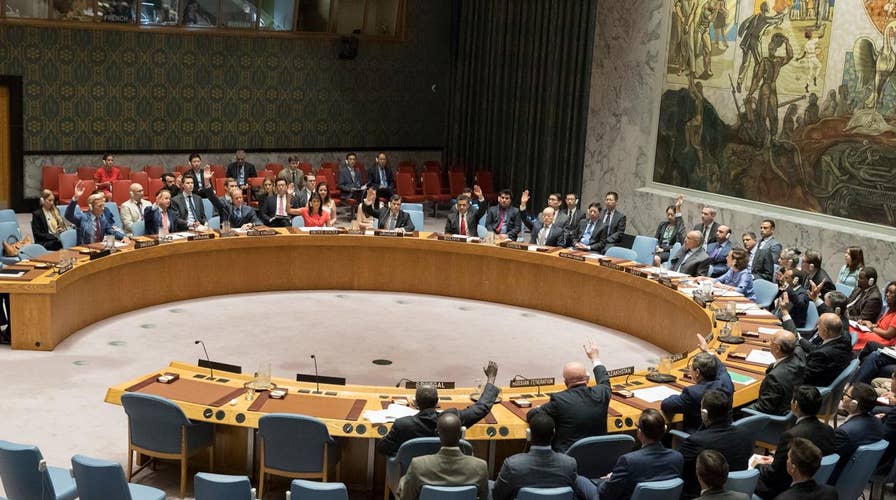President Trump's proposed federal budget calls for slashing U.S. funding for the United Nations’ peacekeeping efforts by almost $275 million in the next fiscal year. The cut – more than 12 percent below what our nation is spending on U.N. peacekeeping this year – is supposed to prioritize domestic initiatives and further the president’s goal of “America First.” It doesn’t.
Instead of enabling our nation to focus on taking care of problems at home rather than worrying about problems all around the world, the proposed peacekeeping cuts would damage America’s vital interests and hurt us on the home front.
As a result, those who agree with the president that we need to put American interests first, fight terrorism and stem the flow of migrants to our shores should oppose the proposed cuts to U.N. funding. The reasoning is simple – peacekeeping works.
And while keeping the peace costs money, war costs us far more – not just in dollars, but in lost lives and damage to American national security.
U.N. peacekeeping missions play a vital role in stabilizing war-torn countries that are making the difficult transition to peace. The U.N. reports that nearly 113,000 troops and military observers, police, international and local civilians, and volunteers are now participating in peacekeeping missions in 15 countries around the world. A total of 124 nations have contributed members of the military and police to these peacekeeping missions.
The peacekeepers directly benefit the United States because they decrease the threat of terrorism and refugee and migrant crises. In congressional hearings earlier this summer, U.S. Ambassador to the U.N. Nikki Haley and members of the House Appropriations Committee rightly focused on the benefits U.S. taxpayers’ get from government spending. Any way you look at it, peacekeeping is a remarkably cost-effective way to safeguard American lives and interests.
Study after study has shown that peacekeeping reduces the risk that conflicts will erupt again. My own research indicates peacekeeping cuts the risk of conflict dramatically – by 75 to 85 percent.
Peacekeeping also reduces the level of violence in ongoing wars, and helps prevent the contagion of conflicts to neighboring countries. These effects combined mean that spending on peacekeeping has dramatic positive effects over time. Peacekeeping saves lives, saves money and makes the world less violent and more stable.
So why should those who prioritize American lives and interests spend their hard-earned tax dollars on saving lives abroad?
First, it's just not that expensive. The U.S. contribution to U.N. peacekeeping this year is about $2.25 billion. That’s certainly a significant amount, but to put that in perspective, it is about half the budget of the City of Houston, and about half the budget of the New York City Police Department. A mere 0.0006 percent of this year’s federal budget goes to fund U.N. peacekeeping operations.
But more importantly, peacekeeping can reduce and prevent overseas conflicts that jeopardize us at home. Wars elsewhere risk the lives of American soldiers, sailors, airmen and Marines if we get sucked into military intervention. And even if we don't, foreign conflicts increase the risk of terrorism, and create refugee and migrant crises.
President Trump campaigned on promises to keep us safe from terrorism and to stem the flow of foreigners to our shores. Every dollar we spend on U.N. peacekeeping helps us achieve these goals.
We know that peacekeeping has helped reduce violence, but it's hard to appreciate the dangers of wars that didn't happen. So to see how peacekeeping can protect Americans, imagine (as a recent study does) if there had been substantially more investment in making and keeping peace in the last few decades.
Recurring wars in Afghanistan might have been prevented or drastically reduced. Al-Qaida might not have had the safe haven that instability in Afghanistan made possible. The attacks of Sept. 11, 2001 might not have occurred, and the U.S. might not have intervened in Afghanistan or Iraq.
Perhaps ISIS might never have come into existence. If the wars in Syria, Yemen, Afghanistan and elsewhere could have been averted, hundreds of thousands of refugees would not have fled their homes for Europe and North America.
Similarly, wars in Central America might have been prevented or contained, stemming the flow of migrants north to the U.S. border.
This is just thought exercise of course; we can't know for sure what the world would look like today if we had invested more in peacekeeping yesterday.
But even if more and better-funded peacekeeping only decreased the probability of some of the instability and prevented some of the deaths the world has seen lately, every dollar spent on peacekeeping would have been worth it.
More funding for peacekeeping won’t magically lead to the end of all wars, of course. And funding levels aren't the only constraints on the U.N.’s ability to deploy effective peacekeepers. Ambassador Haley’s testimony makes clear that she sees the value in peacekeeping, but wants to “trim the fat” around the edges.
There may be ways to reduce the budgets of some individual peacekeeping missions, but most peacekeeping efforts are chronically underfunded – they need more resources to be more effective, not fewer.
The draconian cuts proposed in President Trump’s budget will not put American interests first; they will gut one of the most cost-effective ways we have to safeguard American security and American borders. Peacekeeping is a good deal for America. There should be bipartisan support for investing in this critically important activity.









































